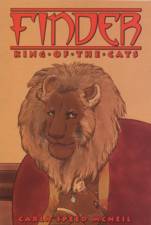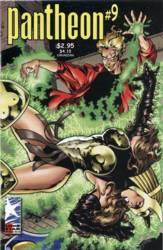






|
Comics to the MAXIt's been quite a while since I did a comic book roundup. I should try to start doing them monthly or something. Anyway, here's a sampling of what's come out in recent weeks.
Alias is written by Brian Michael Bendis and drawn by Michael Gaydos. I'm finding myself overall to be left a little cold by Bendis' writing; while I like Powers quite a bit, I decided not to get on the Ultimate Spider-Man roller-coaster (I have hardcover copies of the original Lee/Ditko/Romita Spider-Man stories, which suits me fine), and his other work hasn't really done it for me. Alias is about a former superheroine who is now a private investigator, and the first issue involves a look at the grungy side of the job, a pretty explicit sex scene between our hero and Power Man, and a case where she trails the sister of a client to find out where she's disappeared to, and finds herself spying on a rather well-known hero. It's quite pedestrian stuff, and isn't helped by the stiff and sketchy art by Gaydos, in a rough Eddie Campbell style that I don't really care for. If the second issue isn't considerably better than this one, I can't see myself continuing with this series.
As with Alias, the first issue of Fury is mostly set-up and not much really happens. Robertson's art is quite good, as it is on Transmetropolitan, but it's good in service to not much story. Heck, if I want to see the depravity that Ennis is showing us here, Transmetropolitan as written by Warren Ellis is a much more effective example of it, and it doesn't sully a long-respected character along the way. Again, unless issue #2 is a big step up, I'm going to call it quits on this one.
She's also messing with the mind of a young and rather inept S.H.I.E.L.D. agent, and spends much of her time pulling appearing-and-disappearing acts. Unfortunately, like the titles above, Elektra is slow. Moreover, all of the characters are either unlikeable or unknowable. Elektra herself falls into the latter category, as she's entirely mysterious and doesn't seem to have any discernable personality. It seems like this series should be better than it is. I don't really have any idea where it's going, and not because it's constantly surprising me. That said, I did appreciate the cliffhanger at the end of the third issue, and I'll probably buy the next issue to see how it turns out.

Generations 2 begins in 1942 and follows a similar conceit, each episode taking place 11 years later, and interlacing with the previous stories. Although it remains to be seen how the running story will turn out, it's again a very entertaining "imaginary" version of well-known characters, and Byrne does a good job rendering all the principals and updating them as the decades roll on. This new series features more appearances from supporting characters like Wonder Woman, the Justice Society, and the Teen Titans (although unfortunately the colorist mis-colored Kid Flash's costume in issue #2). If you enjoy entertaining superhero yarns, I strongly suggest you pick this one up.
 Finally, I'll close out with two independent comics:
Finder is a difficult series to explain. Jaeger, the finder and sin-eater (after a fashion), travels his world as his whim carries him. The first two collections are about a close friend of his in one of the ancient cities on the world, her daughters, and her ex-husband, and the problems that this band of people have with one another, and Jaeger's problematic role in it. King of the Cats involves Jaeger travelling to another city which is part amusement park, part neutral territory for warring tribes, and part holy land for tribes of humanoid cat-people with their strange culture. Jaeger deals with each of these people differently, and we see some more glimpses into who he is and how he operates. Finder is not a dramatic series in the traditional sense. It's more of a running narrative with some occasional fable-like elements. Something about it speaks to me and keeps me reading, though it's hard to vocalize exactly what. But if you're looking for something with strong artwork and which isn't quite like anything else out there, give this a try. (You can check out her Web page at Lightspeed Press.)
That's all for this time!
|
||
 Marvel Comics has decided to start publishing an imprint of "adult-oriented" comics which occur in their universe, with the name of MAX Comics. Unlike DC's Vertigo imprint, which often deals with adult themes and is darker in nature than DC's mainstream titles, it appears that MAX is mainly an excuse to present more sex and violence in comics. Of the first three titles, U.S. War Machine is being published weekly, and they announced that it will be collected in paperback soon after it completes its 12-issue run, so I decided to wait for that. But I did pick up the first issues of the other two titles.
Marvel Comics has decided to start publishing an imprint of "adult-oriented" comics which occur in their universe, with the name of MAX Comics. Unlike DC's Vertigo imprint, which often deals with adult themes and is darker in nature than DC's mainstream titles, it appears that MAX is mainly an excuse to present more sex and violence in comics. Of the first three titles, U.S. War Machine is being published weekly, and they announced that it will be collected in paperback soon after it completes its 12-issue run, so I decided to wait for that. But I did pick up the first issues of the other two titles. The third MAX title is Fury, written by Garth Ennis and drawn by Darick Robertson and Jimmy Palmiotti. Nick Fury, of course, is a long-time Marvel character, and here he's portrayed as a washed-up hero whose days leading S.H.I.E.L.D. to glory are behind him; the world's moved past that. The whole story just feels wrong. Sure, I guess we always knew that Fury is a hard-ass S.O.B. who will kill anyone who gets in his way, who feels alive when he's working on a mission, and who probably sleeps with plenty of women, but we didn't need to be shown all of that. It feels a little disgusting, actually.
The third MAX title is Fury, written by Garth Ennis and drawn by Darick Robertson and Jimmy Palmiotti. Nick Fury, of course, is a long-time Marvel character, and here he's portrayed as a washed-up hero whose days leading S.H.I.E.L.D. to glory are behind him; the world's moved past that. The whole story just feels wrong. Sure, I guess we always knew that Fury is a hard-ass S.O.B. who will kill anyone who gets in his way, who feels alive when he's working on a mission, and who probably sleeps with plenty of women, but we didn't need to be shown all of that. It feels a little disgusting, actually. Before I leave Marvel Comics, I'll also cover another Bendis title, Elektra, which has had three issues published so far. It features very nice painted art by Chuck Austen, but also suffers from Austen's stiff layouts (seems to me that Austen's artistic high point was way back when he was drawing Miracleman under the name Chuck Beckum). Elektra as a longtime Marvel character who's a ninja assassin, who's also died and been resurrected. She's very, very good at what she does, but now she feels rather aimless, and she gotten caught between S.H.I.E.L.D. and Hydra in pursuit of a powerful artifact which is in the hands of Saddam Hussein.
Before I leave Marvel Comics, I'll also cover another Bendis title, Elektra, which has had three issues published so far. It features very nice painted art by Chuck Austen, but also suffers from Austen's stiff layouts (seems to me that Austen's artistic high point was way back when he was drawing Miracleman under the name Chuck Beckum). Elektra as a longtime Marvel character who's a ninja assassin, who's also died and been resurrected. She's very, very good at what she does, but now she feels rather aimless, and she gotten caught between S.H.I.E.L.D. and Hydra in pursuit of a powerful artifact which is in the hands of Saddam Hussein. The only DC comic I'm reviewing is John Byrne's Generations 2, of which 2 issues of the 4-part series have been published. Generations was a fun series which features 8 tales each (save for the last) spaced 10 years apart, from 1939 to 1999. It assumed that Superman and Batman started their careers in the late 1930s, and then lived (and aged) their way through the rest of the century, with appropriate developments in their family life, and passing of their mantles to others, as necessary. It had a cohesive story running through it, and it's a book (in collected form) that I pull out regularly to enjoy again.
The only DC comic I'm reviewing is John Byrne's Generations 2, of which 2 issues of the 4-part series have been published. Generations was a fun series which features 8 tales each (save for the last) spaced 10 years apart, from 1939 to 1999. It assumed that Superman and Batman started their careers in the late 1930s, and then lived (and aged) their way through the rest of the century, with appropriate developments in their family life, and passing of their mantles to others, as necessary. It had a cohesive story running through it, and it's a book (in collected form) that I pull out regularly to enjoy again. Finder I've mentioned before: It's Carla Speed McNeil's ongoing science fictional yarn about a sin-eater character living in what seems to be a post-apocalyptic world, although we're only shown the backdrop without it ever being explained, because it isn't about the world, it's about the characters. King of the Cats is the recently-released third collection of the series.
Finder I've mentioned before: It's Carla Speed McNeil's ongoing science fictional yarn about a sin-eater character living in what seems to be a post-apocalyptic world, although we're only shown the backdrop without it ever being explained, because it isn't about the world, it's about the characters. King of the Cats is the recently-released third collection of the series. Finally, we come back to superheroes. I've gushed about Pantheon before, and it's 12-issue run is now 3/4ths finished, as out beleaguered heroes are continuing to deal with the four powerful villains which their former comrade Daedalus released upon the world to distract them from dealing with his plans to reshape the planet. Though it's so far fallen short of a "grand statement" about superheroes or how superheroes would operate if they actually won and beat all the villains, it's still impressively plotted and drawn, and I'm excited when every issue comes out. It's written by Bill Willingham and drawn by a small cast of artists, most of whom are very good.
Finally, we come back to superheroes. I've gushed about Pantheon before, and it's 12-issue run is now 3/4ths finished, as out beleaguered heroes are continuing to deal with the four powerful villains which their former comrade Daedalus released upon the world to distract them from dealing with his plans to reshape the planet. Though it's so far fallen short of a "grand statement" about superheroes or how superheroes would operate if they actually won and beat all the villains, it's still impressively plotted and drawn, and I'm excited when every issue comes out. It's written by Bill Willingham and drawn by a small cast of artists, most of whom are very good.